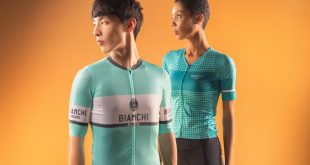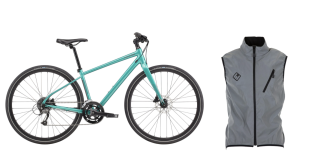Yanto Barker, founder of Le Col, talks to Rebecca Morley about his cycling apparel brand.
“I left school at 17, with three GCSEs and no other qualifications, to be a professional athlete,” says Yanto Barker, founder of cycling apparel brand Le Col. “I did that for about eight years until I realised I wasn’t going to be paid the amount I needed to relax and be financially comfortable and at an age I wanted to retire.”
Le Col was founded in 2011, and Barker ran it alongside his career as a professional cyclist until 2016, when he retired from professional racing to focus on designing the ‘best clothing apparel in the world’. “I felt like starting a company might be something that would engage me and make me a little bit more passionate about what I’m doing next,” he says. “Obviously I’ve been a very passionate cyclist and followed that as a dream from a young child. I was aware of what that felt like and I didn’t really want to let that completely go away. I investigated a couple of different options, like coaching, travel, all related to cycling in some way. The kit project came up and that felt like the one with the most potential.”
Starting from scratch
Barker, however, had no background in design or business and admits that he was starting from scratch. He says he used to sit at his computer and force himself to spend two hours at a time researching, coming up with ideas, making notes, taking pictures and screenshots, and reading up on other brands. “That was basically where it started – I had a bit more of an idea of what I needed to do to build the company.” But as with all start-ups, this wasn’t going to come easy. “I didn’t have any experience, and if anyone was going to invest in me it would be highly risky,” Barker says. “But I had confidence in myself and a belief that I had what it takes to cross the gaps.
“As I’ve gone along that process hasn’t really changed, it’s just gone up a level. With much more investment and much bigger numbers came much more risk, but with that came more experience, again all underpinned by the fact that I believe in myself and I will literally do whatever it takes to make it work,” he continues. “It’s a more stable and safer place when you’ve already demonstrated that you can get across some big gaps and so you can rely on that. It’s there under the bonnet when you need it and you just need to call on it and understand what needs to be done next. The first three years were quite slow and in some way, I wish I could have moved it along quicker, but I couldn’t because I didn’t know what to do. I realised the market was moving along and I needed to speed up otherwise I was going to get left behind, and even though we were growing all the time it wasn’t quick enough. That’s what instigated us to start going for investment.”
Barker then bought the factory that produces Le Col’s kit, which he says enabled the brand to become an integrated business and invest on the product development, more so than other companies of the same size. “I would say I’m quite compulsive in my character, and so I’m dedicated to finding solutions to things that people say weren’t possible,” Barker says. “We just can’t underestimate how many obstacles and how many barriers you face as a young start-up, with people who don’t know who you are and don’t have any reference of what you’re going to do next, even though I will feel quite confident in what we’re doing and what I can achieve.”
No detail too small
Barker describes himself as a very detailed, data-driven person, who is focused on performance. “Performance in a product is essential, the technical delivery of what you get when you buy a product is at the heart of it,” he says. “But not just with the product, it’s cash management, marketing budgets, product development, everything – it’s all about performance.” Customer retention is a high priority at Le Col, and Barker is confident Le Col can compete with bigger brands, as he says after customers have tried the products they are genuinely impressed. In fact, he says the buy-ins from customers have been quicker than the buy-ins from retailers: “Retailers seem to have a vested interest in staying with the brands that they know, just down to the risk aversion. We’re starting to see that changing now but it’s taken a long journey to get that kind of recognition. Even then I think it’s really far behind where we actually are as a business.
“For me, it’s fascinating and interesting and I really enjoy business as much as I enjoyed being an athlete,” Barker continues. “The B2B market and the industry is extremely competitive. There are a lot of start-up companies, especially doing kit because there is a low barrier to entry. Almost anybody, even if they can’t draw, can make a sketch of a jersey, colour it in, put a name on it, say, ‘that’s my brand’, and send it to a factory to produce it. Obviously, you have to start moving and progressing through other aspects of business if you want to make that business a sustainable one and grow it significantly, which I think you need to if you want to earn a decent living. Otherwise, you’ve got a timeframe on your head and it’s just a matter of time before someone comes in and does it better than you.”
He continues: “I’m ready to make sure we progress as a brand, and there are easy and obvious ways to progress the performance and that’s through research and development. At the same time, I also think our low carbon footprint credentials, and just running an ethical business, is really important. We have a partnership with the Tour of Britain and for all the leaders’ jerseys, including the podium jerseys, which are two different types, we use fully 100% recycled material.”
Le Col by Wiggins
Barker has also partnered with Bradley Wiggins for the Le Col by Wiggins collection. He says he’s known Wiggins for a long time, as they were juniors together and raced for Team GB. He says: “I like working with Brad because it’s a bit like a shortcut – we have exactly the same definitions of the industry, even people and places because we started in the same place doing the same thing together. He’s obviously achieved a huge amount in his life on a slightly different career path from me, I just had to look at other avenues and investigate other options for myself post-racing.
“But equally, I’m just as motivated and just as keen to produce something that is excellent. He is a really good ambassador, he’s got a fantastic style, he really gets the progress that we’ve made with the brand. He takes putting his name to something very seriously and obviously, he’s got such a high profile. If he’s putting his name to something substandard it’s just going to come out really quickly. He has described Le Col as the best technical kit on the market, which are his words, which is nice.
“You can’t take that for granted,” Barker continues. “Someone who has achieved what he has would get what that looks like and feels like. It’s good to have that validation, we both have a huge passion for cycling, both as ex-professional athletes but equally as fans of the sport. Brad’s made that really clear in a lot of his media and public speaking situations, that he has idols and heroes, and they’re a huge part of what motivated him and that’s really the same for me, and we are talking about the same generation. It’s nice to get that. The Wiggins Le Col team this year is a huge part of that whole ecosystem. We want to give back to the young guys who are showing talent and development and give them that opportunity that we both had in the early stages of our careers – but it was hard to come by and we had to really take it with both hands.
“Just to be part of a team that is giving that opportunity to talented young athletes that are coming through is really important for us as a legacy, and he gets that as well.” Barker says the sport in the UK, in particular, has gone through a ‘difficult’ time, so Le Col ‘stepped up’. It stepped up its investment in the Wiggins Le Col team this year because it saw an opportunity to give them a bit more support which it thought they would really benefit from. “We want to make sure that’s seen as one of the most exciting development squads in the world, which I think it is,” he adds.
What plans does Le Col have for the future? “Lots and more of everything,” Barker laughs. “We are doing a good job in the UK, we’re still quite a UK centric brand, and so our global expansion steps will be things that come more and more into focus as we go through the next six to 18 months. We’ve got a number of different ways, and we’ve identified different territories to take the first step into that international expansion. My ultimate ambition is to have a brand that is globally recognised, and then have things like continued partnerships with big and respected brands. It’s about quality at every level. We want quality partnerships with quality ideas executed in a quality way, delivering quality products to a quality audience. That is 100% what I’m about and what gets me up in the morning and ready to work hard every day.”
 BikeBiz Bicycle and cycling retail news
BikeBiz Bicycle and cycling retail news




